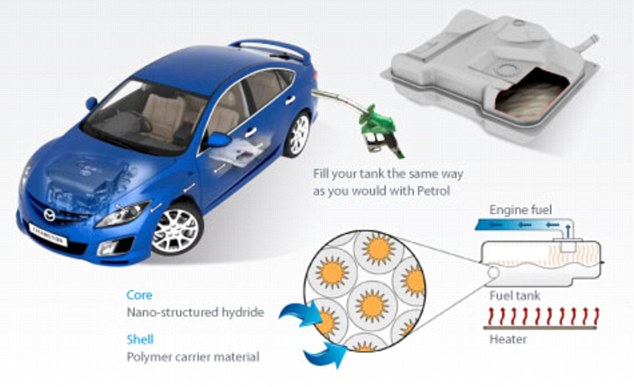
Artificial petrol that costs 19p per litre could be on forecourts in as little as three years.
British scientists are refining the recipe for a hydrogen-based fuel that will run in existing cars and engines at the fraction of the cost of conventional petrol.
With hydrogen at its heart rather than carbon, it will not produce any harmful emissions when burnt, making it better for the environment, as well as easier on the wallet.
The first road tests are due next year and, if all goes well, the cut-price ‘petrol’ could be on sale in three to five years.
Professor Stephen Bennington, the project’s lead scientist, said: ‘In some senses, hydrogen is the perfect fuel. It has three times more energy than petrol per unit of weight, and when it burns, it produces nothing but water.
‘Our new hydrogen storage materials offer real potential for running cars, planes and other vehicles that currently use hydrocarbons.’
The fuel is expected to cost around $1.50 a gallon, or 19p a litre. Even with fuel taxes, the forecourt price is likely to be around 60p a litre – less than half the current cost.
That would bring the price of filling a 70-litre Ford Mondeo down to around £42.
Energy from hydrogen can be harnessed by burning the gas or combining it with oxygen in a fuel cell to produce electricity.
But current methods of storing hydrogen are expensive and not very safe.

To get round this, scientists from the Rutherford Appleton Laboratory, near Oxford, University College London and Oxford University have found a way of densely packing hydrogen into tiny beads that can be poured or pumped like a liquid.
Stephen Volker, of Cellar Energy, which is developing the technology, told Gizmag: ‘We have developed micro-beads that can be used in an existing gasoline or petrol vehicle to replace oil-based fuels.

‘Early indications are that the micro-beads can be used in existing vehicles without engine modification. The materials are hydrogen-based, and so when used produce no carbon emissions at the point of use, in a similar way to electric vehicles.’
A tankful of the artificial petrol, which has yet to be given a brand name, is expected to last 300 to 400 miles, in line with conventional fuel.
But AA president Edmund King warned: ‘The fact the hydrogen is cheaper now doesn’t mean it always will be because the Government would soon get its hands on it and increase the tax.’
RELATED ARTICLES
- New Cars Report All Your Driving Habits to Data Brokers and Insurance
- EVs pollute 1850 times more than Fossil Fuel cars according to new study
- UK Warns that China is Preparing for Total Nuclear War with the West
- Jacob Rothschild Dies At Age 87
- UK Government-Funded Study Found Virtually No Dental Benefit From Fluoridation












What most people forget is that you are allowed to smoke
when you fill´er up with hydrogen, no danger at all.
That alone makes the scheme worthwhile !
However only Baron gets the hang of it, this is the way to go, he-he.
for creating H2, you need energy…
If it’s true that will upset a few arabs and that can only be a good thing :)
Well,that’s one way to do it,but unoriginal.
No,my method uses Radon harvesting.
And Plutonium from the Goverments dispersion scheme at Sellafield.
Baron,
what do you mean by “my fuel cell techology”?
have u got a nuclear reactor in ur backyard? Or are you considering all of us monkeys?
You must have bought this technology from Tesco or Wall Mart,isnt it?
The scientists who invented this will have a very short life expectancy and at least one will probably end up like Dr David Kelley after leaving a suicide note saying it was all a hoax.
You REALLY think that the oild companies and the UK Govt who use motor fuel as a cash cow, will ever allow this? You must be crazy!
Sorry. General Electric does’nt own this, so Immelt’s puppet, Odumbo will never allow it.
What we really need is no artificial government denegrating the consumer via taxation.
Curse in Disguise
My fuel cell technology utilizes naturally occuring radiation that you can find in any reactor core,it uses berilium and the like to generate a Neutron beam that converts water to steam and thus to locomotion.
It’s not rocket science as escape velocity is not a requirement of many domestic situations.